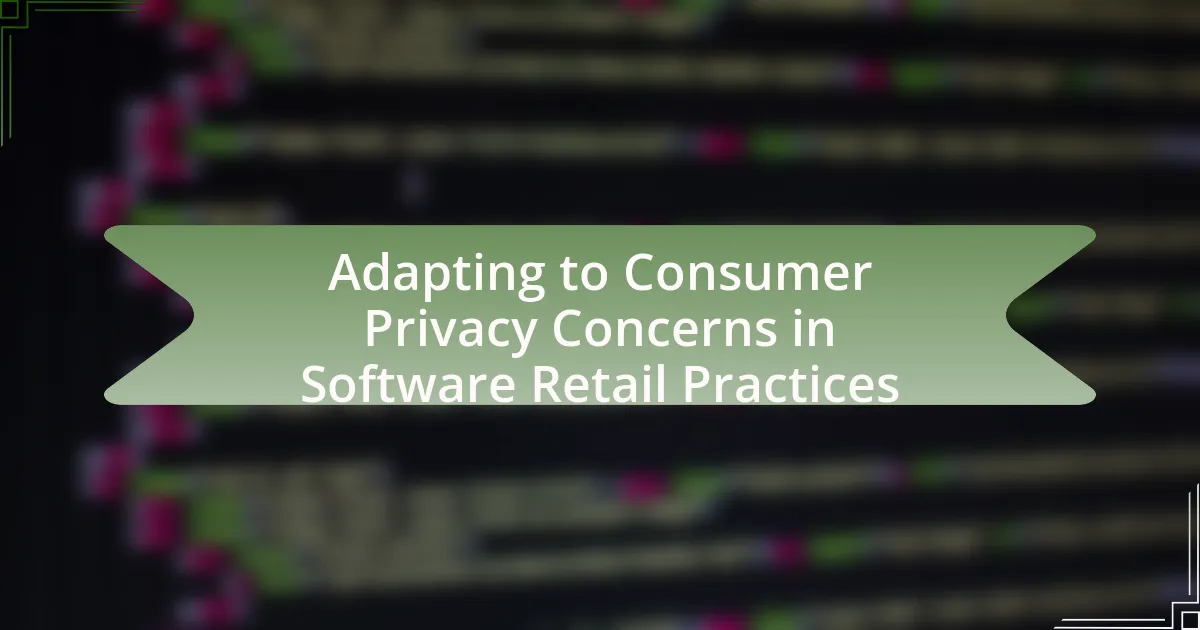The article focuses on consumer privacy concerns in software retail practices, highlighting issues related to data collection, storage, and usage without explicit consent. It emphasizes the importance of consumer trust and brand loyalty, noting that a significant percentage of consumers are apprehensive about how their data is utilized. The article also discusses the evolution of privacy regulations, such as GDPR and CCPA, and their impact on consumer trust and retailer practices. Additionally, it outlines strategies for software retailers to enhance privacy protection, including transparency, robust security measures, and the importance of user consent, while addressing the risks associated with neglecting privacy concerns.
What are Consumer Privacy Concerns in Software Retail Practices?
Consumer privacy concerns in software retail practices primarily revolve around the collection, storage, and use of personal data without explicit consent. Consumers are increasingly worried about how their information, such as purchase history, browsing habits, and personal identifiers, is tracked and utilized by retailers for targeted advertising and marketing. A survey by the Pew Research Center found that 79% of Americans are concerned about how their data is being used by companies, highlighting the widespread apprehension regarding data privacy. Additionally, incidents of data breaches and misuse of personal information have further intensified these concerns, leading to calls for stricter regulations and transparency in data handling practices.
Why are consumer privacy concerns important in software retail?
Consumer privacy concerns are important in software retail because they directly impact customer trust and brand loyalty. When consumers feel that their personal information is not adequately protected, they are less likely to engage with a retailer, leading to decreased sales and potential reputational damage. According to a 2021 survey by the Pew Research Center, 79% of Americans expressed concern about how their data is being used by companies, highlighting the critical nature of privacy in consumer decision-making. Retailers that prioritize consumer privacy can enhance their competitive advantage, as 86% of consumers are willing to pay more for a better experience that includes strong privacy protections, according to a study by Cisco.
What specific privacy issues do consumers face when purchasing software?
Consumers face several specific privacy issues when purchasing software, primarily related to data collection, data sharing, and security vulnerabilities. When consumers buy software, they often must provide personal information, such as names, email addresses, and payment details, which can be collected and stored by the software provider. This data collection raises concerns about how the information is used, whether it is shared with third parties, and the potential for misuse.
Moreover, many software applications include end-user license agreements (EULAs) that may contain clauses allowing for extensive data sharing, often without explicit consent from the consumer. A study by the Electronic Frontier Foundation found that many popular software applications share user data with advertisers and other third parties, which can lead to privacy breaches.
Additionally, consumers may encounter security vulnerabilities in the software they purchase, which can expose their personal data to unauthorized access. According to a report by Verizon, 43% of data breaches involve small businesses, indicating that software purchased from less reputable sources may not have adequate security measures in place to protect consumer data.
These privacy issues highlight the need for consumers to be vigilant about the software they purchase and the privacy policies associated with it.
How do consumer privacy concerns impact purchasing decisions?
Consumer privacy concerns significantly impact purchasing decisions by influencing consumers’ willingness to share personal information. When consumers perceive a risk to their privacy, they are more likely to abandon purchases or choose not to engage with brands that do not prioritize data protection. A study by the Pew Research Center found that 79% of Americans are concerned about how their data is being used by companies, leading to hesitance in completing transactions with businesses that lack transparent privacy policies. This indicates that companies must adapt their retail practices to address these concerns to maintain consumer trust and drive sales.
How have consumer privacy regulations evolved in recent years?
Consumer privacy regulations have significantly evolved in recent years, primarily driven by increasing public awareness and technological advancements. Notably, the implementation of the General Data Protection Regulation (GDPR) in the European Union in 2018 set a global benchmark for data protection, mandating stricter consent requirements and enhancing individuals’ rights over their personal data. Additionally, the California Consumer Privacy Act (CCPA), enacted in 2020, further exemplifies this trend by granting California residents greater control over their personal information and imposing penalties for non-compliance. These regulations reflect a broader shift towards prioritizing consumer privacy, with many jurisdictions worldwide now considering similar laws to protect personal data and ensure transparency in data handling practices.
What are the key regulations affecting software retail practices?
Key regulations affecting software retail practices include the General Data Protection Regulation (GDPR), the California Consumer Privacy Act (CCPA), and the Digital Millennium Copyright Act (DMCA). GDPR mandates strict guidelines on data protection and privacy for individuals within the European Union, requiring software retailers to obtain explicit consent for data collection and provide users with rights to access and delete their data. CCPA enhances privacy rights for California residents, allowing them to know what personal data is collected and to opt-out of its sale. DMCA addresses copyright issues, providing a framework for software retailers to manage copyright infringement and protect intellectual property. These regulations collectively shape how software retailers handle consumer data and intellectual property, ensuring compliance and consumer trust.
How do these regulations influence consumer trust?
Regulations influence consumer trust by establishing clear standards for data protection and privacy, which reassure consumers that their personal information is safeguarded. For instance, the General Data Protection Regulation (GDPR) in the European Union mandates that companies obtain explicit consent from users before processing their data, thereby enhancing transparency and accountability. This legal framework has been shown to increase consumer confidence, as a survey by the European Commission indicated that 70% of respondents felt more secure about their data after the implementation of GDPR. Consequently, adherence to such regulations fosters a trustworthy relationship between consumers and businesses, as consumers are more likely to engage with companies that demonstrate a commitment to protecting their privacy.
How can software retailers adapt to consumer privacy concerns?
Software retailers can adapt to consumer privacy concerns by implementing transparent data practices and enhancing security measures. Transparency involves clearly communicating data collection, usage, and sharing policies to consumers, which builds trust and aligns with regulations like the General Data Protection Regulation (GDPR). Additionally, retailers should adopt robust security protocols, such as encryption and regular security audits, to protect consumer data from breaches. According to a 2021 survey by the International Association of Privacy Professionals, 79% of consumers are more likely to engage with companies that prioritize data privacy, highlighting the importance of these adaptations for maintaining customer loyalty and compliance.
What strategies can software retailers implement to enhance privacy protection?
Software retailers can enhance privacy protection by implementing robust data encryption methods. This strategy ensures that sensitive customer information, such as payment details and personal data, is securely encoded, making it inaccessible to unauthorized users. According to a report by the Ponemon Institute, organizations that employ encryption experience 50% fewer data breaches compared to those that do not. Additionally, retailers should adopt transparent privacy policies that clearly outline data collection, usage, and sharing practices, fostering consumer trust. Implementing regular security audits and compliance checks with regulations like GDPR further strengthens privacy measures, as evidenced by the increased accountability and reduced risk of penalties for compliant organizations.
How can retailers ensure data transparency with consumers?
Retailers can ensure data transparency with consumers by clearly communicating their data collection, usage, and sharing practices. This involves providing accessible privacy policies that outline what data is collected, how it is used, and with whom it is shared. According to a 2021 survey by the International Association of Privacy Professionals, 79% of consumers expressed a desire for more transparency regarding their data. By implementing user-friendly consent mechanisms and allowing consumers to easily access and manage their data, retailers can build trust and foster a transparent relationship with their customers.
What role does user consent play in software retail practices?
User consent is crucial in software retail practices as it ensures that consumers have control over their personal data and how it is used. This control is mandated by regulations such as the General Data Protection Regulation (GDPR), which requires explicit consent from users before collecting or processing their data. Compliance with these regulations not only protects consumer privacy but also builds trust between consumers and software retailers, leading to increased customer loyalty and potentially higher sales. Studies indicate that 79% of consumers are concerned about how their data is used, highlighting the importance of obtaining informed consent in fostering a positive relationship with customers.
How can technology be leveraged to address privacy concerns?
Technology can be leveraged to address privacy concerns through the implementation of advanced encryption methods and data anonymization techniques. Encryption secures personal data by converting it into a coded format that can only be accessed by authorized users, thereby protecting sensitive information from unauthorized access. For instance, end-to-end encryption used in messaging apps ensures that only the communicating users can read the messages, safeguarding their privacy.
Data anonymization further enhances privacy by removing personally identifiable information from datasets, allowing organizations to analyze data without compromising individual identities. According to a study by the National Institute of Standards and Technology, effective anonymization techniques can significantly reduce the risk of re-identification, thus protecting consumer privacy while still enabling data-driven insights.
Additionally, technologies such as blockchain provide transparency and control over personal data, allowing users to manage their privacy settings actively. By utilizing these technological solutions, organizations can build consumer trust and comply with privacy regulations, such as the General Data Protection Regulation (GDPR), which mandates strict data protection measures.
What tools and technologies can help in safeguarding consumer data?
Encryption tools, such as AES (Advanced Encryption Standard) and RSA (Rivest-Shamir-Adleman), are essential for safeguarding consumer data by converting it into a secure format that is unreadable without a decryption key. These encryption methods protect sensitive information during transmission and storage, ensuring that unauthorized access is prevented. Additionally, data loss prevention (DLP) technologies monitor and control data transfers, helping to prevent accidental or malicious data breaches. According to a report by the Ponemon Institute, organizations that implement encryption and DLP solutions experience a 30% reduction in data breach costs. Furthermore, secure access technologies, including multi-factor authentication (MFA) and identity and access management (IAM) systems, enhance security by ensuring that only authorized users can access sensitive consumer data. These tools collectively contribute to a robust framework for protecting consumer privacy in software retail practices.
How can retailers use encryption to protect consumer information?
Retailers can use encryption to protect consumer information by implementing strong encryption protocols for data at rest and in transit. This means that sensitive data, such as payment information and personal details, is encoded in a way that only authorized parties can access it. For instance, using Advanced Encryption Standard (AES) with a key size of at least 256 bits ensures that even if data is intercepted, it remains unreadable without the decryption key. According to the 2021 Verizon Data Breach Investigations Report, 61% of data breaches involved the theft of personal information, highlighting the critical need for robust encryption measures to safeguard consumer data.
What are the implications of ignoring consumer privacy concerns?
Ignoring consumer privacy concerns can lead to significant reputational damage and loss of customer trust. When companies fail to address privacy issues, they risk alienating their customer base, as 79% of consumers express concerns about how their data is used, according to a 2021 survey by Pew Research Center. This erosion of trust can result in decreased sales, as 81% of consumers stated they would stop doing business with a company that they believe misuses their data. Additionally, regulatory repercussions may arise, as non-compliance with privacy laws like GDPR can lead to hefty fines, with penalties reaching up to 4% of a company’s global revenue. Therefore, neglecting consumer privacy concerns not only jeopardizes customer relationships but also exposes businesses to financial and legal risks.
What risks do software retailers face if they neglect privacy issues?
Software retailers face significant risks, including legal penalties, reputational damage, and loss of customer trust, if they neglect privacy issues. Legal penalties arise from non-compliance with regulations such as the General Data Protection Regulation (GDPR), which can impose fines up to 4% of annual global revenue. Reputational damage occurs when consumers become aware of privacy breaches, leading to negative publicity and potential boycotts. Additionally, loss of customer trust can result in decreased sales and customer loyalty, as studies indicate that 79% of consumers are concerned about how their data is used. These factors collectively threaten the sustainability and profitability of software retailers.
How can negative consumer perceptions affect a retailer’s brand?
Negative consumer perceptions can significantly damage a retailer’s brand by leading to decreased customer loyalty and reduced sales. When consumers perceive a retailer negatively, often due to issues like poor customer service or privacy concerns, they are less likely to make purchases or recommend the brand to others. For instance, a study by the Harvard Business Review found that a 5% increase in customer retention can lead to a 25% to 95% increase in profits, highlighting the financial impact of consumer perceptions. Additionally, negative reviews and social media backlash can further amplify these perceptions, resulting in long-term reputational harm and a decline in market share.
What legal consequences might arise from inadequate privacy practices?
Inadequate privacy practices can lead to significant legal consequences, including fines, lawsuits, and regulatory penalties. For instance, the General Data Protection Regulation (GDPR) imposes fines of up to 4% of a company’s global annual revenue for non-compliance with data protection standards. Additionally, companies may face class-action lawsuits from consumers whose data has been mishandled, resulting in costly settlements and reputational damage. Furthermore, regulatory bodies, such as the Federal Trade Commission (FTC) in the United States, can impose sanctions and require companies to implement corrective measures, further impacting their operations and financial stability.
How can retailers measure the effectiveness of their privacy practices?
Retailers can measure the effectiveness of their privacy practices by conducting regular assessments and audits of their data handling processes. These assessments can include evaluating compliance with regulations such as GDPR and CCPA, analyzing customer feedback regarding privacy concerns, and monitoring data breach incidents. For instance, a study by the International Association of Privacy Professionals found that organizations with robust privacy programs experienced 50% fewer data breaches compared to those without. This data highlights the correlation between effective privacy practices and reduced risk, providing concrete evidence for retailers to gauge their privacy effectiveness.
What metrics should be used to assess consumer trust and satisfaction?
To assess consumer trust and satisfaction, key metrics include Net Promoter Score (NPS), Customer Satisfaction Score (CSAT), and Customer Effort Score (CES). NPS measures the likelihood of customers recommending a brand, indicating overall trust and loyalty. CSAT gauges customer satisfaction with specific interactions or products, providing insight into consumer experiences. CES evaluates how easy it is for customers to engage with a service or product, reflecting their satisfaction and trust in the brand’s efficiency. These metrics are supported by industry research, such as the 2021 Customer Experience Trends report by Salesforce, which highlights the importance of measuring customer sentiment to enhance trust and satisfaction in retail practices.
How can feedback from consumers inform privacy strategies?
Feedback from consumers can inform privacy strategies by providing insights into their concerns and expectations regarding data protection. This feedback allows organizations to identify specific areas where privacy practices may be lacking or misunderstood, enabling them to tailor their strategies accordingly. For instance, a survey conducted by the Pew Research Center found that 79% of Americans are concerned about how their data is being used by companies, highlighting the need for businesses to address these concerns directly in their privacy policies and practices. By actively engaging with consumer feedback, companies can enhance transparency, build trust, and ensure compliance with evolving privacy regulations, ultimately leading to more effective privacy strategies.
What best practices should software retailers follow to enhance consumer privacy?
Software retailers should implement data minimization, transparency, and robust security measures to enhance consumer privacy. Data minimization involves collecting only the information necessary for transactions, thereby reducing the risk of exposure. Transparency requires retailers to clearly communicate their data collection practices and privacy policies, allowing consumers to make informed decisions. Robust security measures, such as encryption and regular security audits, protect consumer data from breaches. According to a 2021 study by the International Association of Privacy Professionals, organizations that prioritize these practices experience significantly fewer data breaches and higher consumer trust.
How can retailers create a culture of privacy within their organizations?
Retailers can create a culture of privacy within their organizations by implementing comprehensive privacy policies and training employees on data protection practices. Establishing clear guidelines for data handling and ensuring that all staff understand the importance of consumer privacy fosters accountability. Regular training sessions and workshops can reinforce these principles, making privacy a core value of the organization. Additionally, retailers should conduct regular audits and assessments of their data practices to identify vulnerabilities and ensure compliance with privacy regulations, such as the General Data Protection Regulation (GDPR), which mandates strict data protection measures. By prioritizing transparency and consumer trust, retailers can effectively cultivate a culture of privacy.
What ongoing training should staff receive regarding consumer privacy?
Staff should receive ongoing training on data protection regulations, privacy policies, and best practices for handling consumer information. This training should cover key regulations such as the General Data Protection Regulation (GDPR) and the California Consumer Privacy Act (CCPA), which mandate strict guidelines for data collection, storage, and sharing. Additionally, staff should be educated on the importance of consumer consent, data minimization, and secure data handling techniques to prevent breaches. Regular updates and refresher courses should be implemented to keep staff informed about evolving privacy laws and emerging threats, ensuring compliance and fostering a culture of privacy awareness within the organization.



